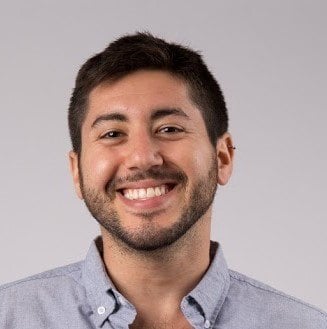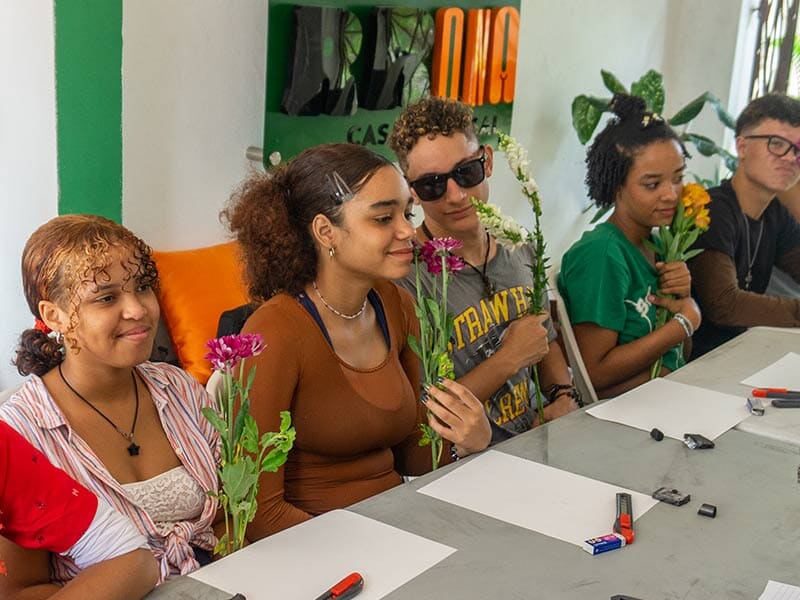
“My neighborhood is known as the backyard — as in, the place where you throw the trash,” says Fernando Saint Hilaire of his barrio outside Santo Domingo in the Dominican Republic. “We are the other side of the tracks. But when you grow up living in poverty, you’re used to the misery. You don’t realize it doesn’t have to be that way.”
For Fernando, that realization changed everything. In 2022, he began attending workshops run by Centro para la Educación y el Desarrollo, or CEDUCA — an AJWS grantee organization that trains young people from poor communities to become social activists and leaders so they can influence municipal and national authorities and create change. And in a country where politicians are seen as deeply corrupt, violence is widespread and resource inequality is rampant, there is plenty of work for young activists fighting for their communities’ basic rights.
Just as Fernando was honing his leadership, he was pulled into action to serve his own community: a gang member was murdered in the streets of his neighborhood, and a WhatsApp recording from rival gang members threatening retribution spread rapidly. Police refused to respond for days, and people shuttered businesses out of fear. Fernando mobilized his community — hundreds marched on the police station, demanding protection. And it worked; police finally patrolled the streets, and the community was able to come out of hiding and resume their lives.
That success emboldened Fernando’s resolve — he knew he was on the right path.

Becoming the protagonists in their own stories
CEDUCA’s founder, Alba Reyes, has been a human rights activist in the Dominican Republic for decades. But she’s found new fire in training young people to carry on her legacy.
“We’re planting a seed for young people to become the protagonists in their own stories,” says Alba. “They are the drivers of change in their communities. And as each of these communities becomes more empowered, we build a movement of change that’ll affect the whole nation.”
CEDUCA’s team of volunteers and staff call themselves ‘multipliers’ because they pass along their own education and training to others by organizing local youth groups and holding trainings and workshops on civic engagement, sexual health, leadership and more. Alba’s aim is to build a self-sustaining circle of activism — one that eventually won’t depend on her leadership — where young leaders continuously empower other young people to take action and become agents of change.

Multiplying activism and empowering young people
Today, Fernando is a core member of the CEDUCA team, passing “what was done for me to others, to awaken the youth so they understand that our reality is not sustainable.” He leads workshops educating young people in other communities about their human rights — access to education, health, water — and then helps them mobilize the greater community, multiplying their impact.
Among these new activists are Orlanda and her niece, Erica, who grew up in the rural village of El Licey — a community founded by escaped enslaved people in colonial times. The two young women are recent graduates of CEDUCA’s socio-political training course. The course features 2.5 months of seminars and trainings to awaken the spark of activism in young people from poor neighborhoods.
“For me, there’s a before CEDUCA and an after,” says Orlanda proudly. “We not only learned what we have a right to, we also gained the tools to demand those rights. You can’t ask for what you don’t know exists.”
At the early stages of their activism, Orlanda and Erica organized two basketball tournaments to get young people engaged before they launch their own workshops on leadership and civic activism.
“If we tell young people we’re meeting to talk about human rights, about our future, that’s a hard sell,” laughs Erica. “But planning a basketball tournament to get people together, that’s the start of creating youth participation here.”
They’re already optimistic. “Our community is very poor, but we’re planting hope that things can change. Instead of playing in the streets or dropping out of school, let’s stimulate our minds and teach each other,” says Orlanda. “We lack material wealth, but there is power in acquiring knowledge.








